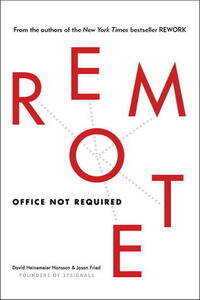Take a photo of a barcode or cover
Great read about the numerous recipes and options for working remote. For employees or managers there are important perspectives here that it’d be foolish to ignore
An easy read, with solid good (though some idealized) advice. I'd tend to give it 3.8.
Quick and enjoyable opinionated read. Some solid points about why remote work is great for the employee and employer: tl;dr it makes the work more important and keeping up appearances less important. Not much else valuable in the book though.
I was hoping for more depth. Very quick read given that every 3rd page is a picture or illustration. By page ~80 it felt like we finally got into how to work remotely but it stayed very obvious. A few interesting tidbits here and there but if you‘re already working remotely you won‘t get much new inspiration. The recurring plugs about the company who the author founded felt a little salesy.
Not a bad book, but feels very basic right now, almost quaint. It's in severe need of an update. It was released on 2013! It's crazy how long it feels.
A good book with some solid insights into remote work, but nothing groundbreaking (at least now that remote work is normal).
challenging
hopeful
informative
inspiring
lighthearted
relaxing
fast-paced
The book would be really valuable for (and is aimed at) people looking to start working remotely. Having 10 years of remote working experience (8+ years since the last time I worked in an office) I completely agree with everything they say in the book and would definitely recommend it to anyone thinking about making a move to remote employment. And even if you think it is not for you, I'd still recommend you to look at the book to better understand remote employees in your current or your future teams.
informative
medium-paced
The good: This book is nice and short, and looks at remote work before COVID. This is a useful perspective when most contemporary writing about remote work is informed by teams' experiences in a pandemic context, which is may not generalize to the future.
The bad: Having been written in 2013, the book spends a lot of effort trying to convince you to try remote work, rather than on the practicalities of managing it. It's also less compelling to read advice on how to set up a company culture from a company that has recently famously lost more than 30% of their team due to cultural problems. In that context, parts like "our schedule is a bit irregular, but we try to pick up the phone and talk with every remote person at least once every few months" sticks out as a red flag. Every few months?
Read this if: You're leading a team of remote workers and are looking for more sources about remote work written before COVID, and are ready to be on the lookout for dated advice and the authors' cultural blind spots.
The bad: Having been written in 2013, the book spends a lot of effort trying to convince you to try remote work, rather than on the practicalities of managing it. It's also less compelling to read advice on how to set up a company culture from a company that has recently famously lost more than 30% of their team due to cultural problems. In that context, parts like "our schedule is a bit irregular, but we try to pick up the phone and talk with every remote person at least once every few months" sticks out as a red flag. Every few months?
Read this if: You're leading a team of remote workers and are looking for more sources about remote work written before COVID, and are ready to be on the lookout for dated advice and the authors' cultural blind spots.


